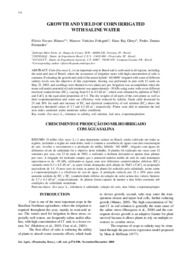Growth and yield of corn irrigated with saline water.
Growth and yield of corn irrigated with saline water.
Author(s): BLANCO, F. F.; FOLEGATTI, M. V.; GHEYI, H. R.; FERNANDES, P. D.
Summary: Corn (Zea mays L.) is an important crop in Brazil and is cultivated in all regions, including the semi-arid area of Brazil, where the occurrence of irrigation water with high concentration of salts is common. Evaluating the growth and yield of the maize hybrid 'AG 6690' irrigated with water of different salinity levels was the objective of this experiment. Sowing was performed in pots with 12 seeds on May 23, 2003, and seedlings were thinned to two plants per pot. Irrigation was accomplished when the mean soil matric potential of each treatment was approximately -30 kPa using water with seven different electrical conductivities (ECi), varying from 0.3 to 4.5 dS m-1, which were obtained by addition of NaCl and CaCl2 in the equivalent proportion of 1:1. The dry weights of all parts of the corn plants as well as their evapotranspiration and water use efficiency were reduced by salinity. Grain yield decreased by 21 and 20% for each unit increase of ECi and electrical conductivity of soil solution (ECs) above the respective threshold values of 1.7 and 4.3 dS m-1, respectivelly. Plants were able to maintain the leaf area index unaltered under moderate saline conditions.
Publication year: 2008
Types of publication: Journal article
Unit: Embrapa Mid-North
Observation
Some of Embrapa's publications are published as ePub files. To read them, use or download one of the following free software options to your computer or mobile device. Android: Google Play Books; IOS: iBooks; Windows and Linux: Calibre.
Access other publications
Access the Agricultural Research Database (BDPA) to consult Embrapa's full library collection and records.
Visit Embrapa Bookstore to purchase books and other publications sold by Embrapa.

